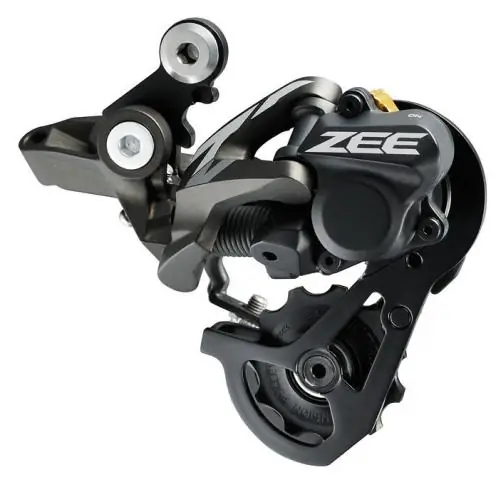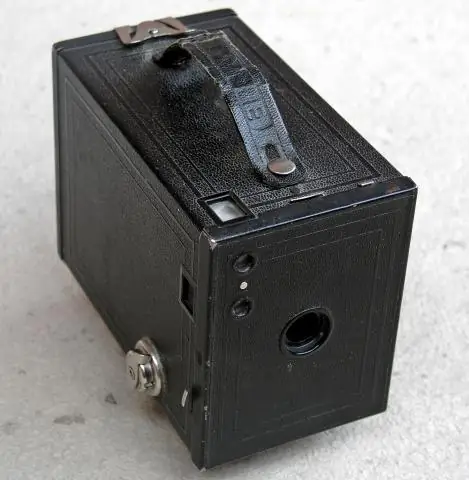
Table of contents:
- How to set up gear shifting on a mountain or city bike
- What parts help to adjust the speed switches
- Speed change mechanism
- Gear shift types
- Switch classification
- What can affect the quality of the switches
- How to adjust the rear derailleur
- Front derailleur adjustment
- How to change gears on any bike from Merida to ladies
- Author Bailey Albertson [email protected].
- Public 2023-12-17 12:53.
- Last modified 2025-01-23 12:41.
How to set up gear shifting on a mountain or city bike

Speed switches are actively used when riding both mountain and city bikes. Much depends on their quality work: the pleasure of cycling, the quality of the ride and even your safety. This mechanism should be checked and, if necessary, adjusted correctly before each cycling season.
Content
- 1 What parts help to adjust the speed switches
-
2 Mechanism of speed change
2.1 How the speed switch works - video
-
3 Types of gear shifting
- 3.1 Internal gear shifting on a mountain bike
-
3.2 External Shifting on a Speed Bike
3.2.1 Bicycle chassis design, principles of operation - video
- 3.3 Combined mechanism
-
4 Switch classification
4.1 The Difference Between Shimano Line Devices - Video
-
5 What can affect the quality of the switches
- 5.1 Stretched rope
- 5.2 Broken rope
- 5.3 Changing the cable on the bike - video
- 5.4 Problems with the parallelogram spring
- 5.5 Rooster bent or broke
- 5.6 Deformation of the switch
- 5.7 Changing the bike transmission parts - video
-
6 How to adjust the rear derailleur
6.1 Setting the rear derailleur - video
-
7 Front derailleur adjustment
-
7.1 Setting the correct operation of the mechanism
7.1.1 Troubleshooting the front derailleur - video
-
-
8 How to switch speeds on any bike from Merida to ladies
8.1 How to switch speeds correctly - video
What parts help to adjust the speed switches
A multi-speed mountain bike or city bike has multiple gears and new possibilities. It is much easier to conquer peaks, ride on irregularities, even perform various tricks on it. To enjoy cycling, you need to set the speed switch correctly.
Those who first decided to understand the switch mechanism on their own should first familiarize themselves with the transmission details and their functions.

Knowledge of the structure of modern bicycles helps to properly set up gear shifting
We will not dwell on each part of the bike in detail. Let's consider just some of the elements that make up the transmission.
- the front derailleur assists the chain in guiding the chainring. Attaches to the frame near the pedals;
-
the system is part of the front derailleur. It also consists of stars, different in diameter and number of teeth, which are attached to the connecting rods with special bolts;

Front derailleur The front derailleur is in the pedal area
- the rear derailleur helps the chain run over the cassette drive sprockets. Located in the rear wheel area;
-
cassette / ratchet is part of the rear derailleur. Consists of several stars, different in diameter and number of teeth. On expensive bicycles, the cassette is attached to the drum. In cheap ones, there is a ratchet instead of a drum. The latter can also be seen on older bike models;

Rear derailleur Rear derailleur located on the rear wheel
-
chain - part of the transmission, which must be periodically lubricated with special oils and washed;

Chain The bike chain is an important part of the drivetrain
-
shifters (or shifters) - a device with which the cyclist controls gearshift. Pressing the lever changes the cable tension, as a result of which the speed changes. It is mounted on the steering wheel, near the handles. The shifter at the right handle is responsible for the rear derailleur, on the left - for the front. There are bicycles with one right shifter;

Shifters Shifters are mounted on the handlebars and are responsible for gear shifting
- cables - the parts that connect the shifters to the speed switches. A high-quality transition from one speed to another depends on the correct tension of the cable;
-
shirt - a rigid tube through which a cable runs. Attaches to the frame.

Cable The transmission cable connects the shifter to the derailleur
Speed change mechanism
The work of the rear and front derailleur is as follows: if the cable is pulled, the derailleur frame moves the chain to higher sprockets. If, on the contrary, weaken the cable, then the frame will throw the chain onto the smaller stars.
The speeds are switched with the help of shifters (coins) located on the steering wheel. The rear derailleur is adjustable with the right shifter. Thus, the chain jumps between the rear sprockets. And the front derailleur is adjustable with a shifter on the left side. So the chain jumps among the chainrings.
How the speed switch works - video
Gear shift types
Before making any adjustments, determine what kind of gear shift your bike has. There are 3 main types of switches.
- External switching mechanism.
- Internal switching mechanism.
- Combined type.
Internal gear shifting on mountain bike
The basis of this design is planetary bushings. This mechanism does not use cassettes. The transmission includes only 2 stars: front and rear. The whole mechanism is hidden inside. There is usually no front derailleur either.

All elements of the speed switch are hidden in the body
This mechanism is often found on road bikes, pleasure bikes, folding bicycles and city bikes. The system itself is located inside the rear planetary hub. This type of shifter can be found, for example, on the Forward Surf city bike (3 gears).
External shifting on a speed bike
The outer type belongs to most multi-speed bicycles. It is used on both mountain and city walking models. The mechanism is made up of gear shifters and stars that form a cassette or system. The speed is changed using the rear and front derailleurs.

External gear shift elements - derailleur and cassette
This type of gear shifting can be seen on both the Forward Dortmund city bike (7 speeds) and the Forward Agris mountain bike (24 speeds). You can customize this switch yourself by examining the mechanism.
Bicycle undercarriage device, principles of operation - video
Combined mechanism
The combined type is a combination of external and internal mechanisms. It attaches to the bike's rear wheel hub.

The combo derailleur is a hybrid of the external and internal types of bike shifting.
This mechanism is extremely rare, since it has collected all the negative aspects of both external and internal gearshift systems. It is configured only by a professional.
Switch classification
In the modern world, there are many companies that create equipment for bicycles. The best quality models are made by corporations such as Shimano (Japan) and Sram (America), producing entire lines of derailleurs.
Devices for professionals:
- Shimano XTR, Sram ESP 9.0 and Sram ESP X.0 are leading the way in price and quality. They are mainly used in competition bicycles. They are characterized by low construction weight.
- Shimano deore xt, Shimano Saint, Shimano slx finished second in the same category. Used in bicycles with 27 gears.
- Shimano Deore LX, Shimano Dura-Ace, Shimano Hone - 3rd place. They are designed for devices with the maximum number of speeds.
Sports bike lines:
- Sram ESP 7.0 and Shimano Deore are similar designs. Composed of highly durable components and designed for 24 gears.
- Sram ESP 4.0, Sram ESP 5.0, Shimano Nexave and Shimano alivio are cheaper than the professional line. They can handle up to 24 speeds and are designed for touring bike models.

Sram ESP 7.0 derailleur specially designed for sports bikes
Hobbyist Switch Line:
- The Sram ESP 4.0, Shimano C201 and Shimano acera are bundled with cheaper entry-level hybrids and mountain bikes. Withstand up to 24 gears.
- Sram ESP 3.0, Shimano Nexus, and Shimano altus are designed for touring, city bikes.
- The Shimano tourney is built for a calm, smooth ride. Shifts 21 gears.
There is no fundamental difference in the adjustment and operation of different switch lines from the same company. For example, different Shimano derailleur groups work the same and are interchangeable. For example, nine-speed Deore, Deore XT, Deore LX, XTR systems can be installed on the drive of eight-speed Alivio, Altus, Acera switches and vice versa.
The Difference Between Shimano Line Devices - Video
What can affect the quality of the switches
It is important to find out what caused the problem.
Stretched rope
This defect is regulated by a drum on a shifter.
- When the chain moves silently and hardly jumps onto large stars, then the cable is stretched. Turn the drum clockwise until the part is tensioned to the desired position.
- In the case when the chain does not want to go down on small stars, relax the cable by turning the drum counterclockwise.
- Check the operation of the speed switch. Twist the drum if necessary. Adjust until the chain bounces smoothly.
Broken cable
If the part is damaged, it must be replaced.
- Unscrew the fixing screw on the bulkhead.
- Disassemble the lever to remove the cable.
- Insert a new one, treat with special grease.
- Run it through the shirts and put them back in place.
- Secure the new cable to the derailleur.
Change the cable on the bike - video
Parallelogram spring problems
For better operation of the return spring, you need to wash it. Then grease after cleaning.
Rooster bent or broke
If the foot of the rear derailleur is oblique, then the mount is bent. You can fix this defect yourself.
- Hold the foot with one hand and grasp the switch with the other.
- Carefully, without sudden movements, align the position of the cock until the rear frame is level.
Deformation of the switch
A common cause of such a breakdown is a blow from a bicycle. Usually the rear derailleur suffers, the front derailleur is very difficult to bend. After a breakdown, it is worth checking which parts are broken.
- If it is a frame - align or change the part.
- If the screw that adjusts the chain tension or the eyelet that secures this screw breaks, then it is better to replace the parts. Otherwise, the speeds will switch very poorly.
Changing bike transmission parts - video
How to adjust the rear derailleur
The rear derailleur is a machine that transfers the chain from one sprocket of the rear wheel to another. Today, the vast majority of high-speed bicycles are equipped with such a switch.

Most speed bikes are equipped with a rear derailleur.
The rear derailleur consists of the following elements.
- Switch frame. The number of bike speeds depends on its length.
- Two rollers that are responsible for the direction of the chain: the guide and the tensioner roller.
- The mechanism itself (parallelogram).
- Fastening bolt.
- Lower gear limiter - screw marked L.
- Top gear limiter - screw with the inscription H.
- Cable guide groove.
- Tensioner adjustment screw.
Setting the rear derailleur is necessary if the mechanism is out of order, the chain jumps over the necessary stars, the speed does not switch, a grinding or loud sounds are heard. You can configure the mechanism and debug its work yourself. You will need a Phillips screwdriver and a # 5 Allen key.
First, make sure the derailleur is vertical and parallel to the bike. If everything is in order, you can proceed to the setup. For convenience, turn the bike upside down, placing it on the saddle and handlebars, this will give access to the switch itself and the adjustment screws.
-
First, lower the chain to the smallest sprocket. Do this with the shifter on the right handlebar of the bike, which is responsible for the rear derailleur.

Shifter Use the right shifter to lower the chain
-
Loosen the screw holding the cable. This is done in order to unlock the switch.

Screw Loosen the screw holding the cable
-
Prepare a screwdriver and find the screw with the Latin letter H.

Screw H Screw H limits top gear
-
Move the switch so that the sprockets on which the chain lies (one star on the cassette, two stars on the switch) are in the same plane, that is, they form one line.

Adjust the screw H All 3 stars must lie in the same plane
-
Take the cable with your hand. It must be pulled out as much as possible and fixed by tightening the screw.

Clamp the cable We pull off the cable by hand and fix the screw
-
Check if the switch is working properly. If it doesn’t go over large stars, turn the thumbscrew counterclockwise, pulling the cable.

Lamb Adjust the tension of the cable by turning the lamb
- Now move the chain to the smallest star using the shifters.
-
Find the screw with the Latin letter L.

Screw L Adjusting the switch position
-
Change the position of the derailleur so that the largest sprocket in the cassette is in the same plane with the derailleur foot, forming a straight line with it.

Stars in one plane Adjust until the frame and the largest star form one line
Rear Derailleur Setting - Video
Front derailleur adjustment
The front derailleur is less common than the rear derailleur. Bicycles with this device are cheaper. The front derailleur moves the chain over the chainrings. Moving from side to side, he pushes the chain to the next star.

Front derailleur device
Front derailleur device.
- Switch frame. A chain passes through it, this is the main element when switching speeds. It moves to the sides in front of the front stars.
- Parallelogram - directly the mechanism (speed switch). Includes a spring.
- Fastening to the frame.
- Upper stop L.
- Lower stop H.
- Fastening the cable.
The main problem with the front derailleur is that the chain hits the frame when driving. You can fix this problem yourself.
Setting the correct operation of the mechanism
- First you need to put the smallest star in front, and the maximum at the back. To do this, rotate the pedals while pressing the shifter.
-
Use the # 5 Allen key to lower the screw holding the cable.

Fastening the cable Lowering the screw holding the cable
-
Take a screwdriver, find screw L. Move the frame so that the distance from its inner part to the chain is approximately 4 mm.

Screw L We adjust the correct position of the frame, for this we turn the screw L
-
Reattach the cable. To do this, tighten it with your fingers and tighten the screw that presses against the cable.

Fastening the cable Hold the cable with your hand and fix the screw
- Now you need to adjust the second star. First, place the smallest sprocket on the rear derailleur and the front derailleur over to the old one.
-
See if the chain is touching the outside of the frame. If the problem persists, tighten the cable with the thumb on the left shifter. Turn it counterclockwise until the chain is in the desired position. The distance from it to the frame should be approximately 3 mm.

Lamb We stretch the cable by turning the lamb counterclockwise
-
Move to the third star. If the chain touches the frame, use a screwdriver to adjust screw H. It is necessary to increase the gap by moving the frame outward.

Screw H We adjust the frame with screw H
Troubleshooting Front Derailleur - video
How to change gears on any bike from Merida to ladies
To ride easily and comfortably, while making less effort, you need to switch gears correctly.
- When you hear extraneous sounds when changing gears, the transmission has not worked. You need to squeeze the lever of the shifter.
- If you decide to conquer the top, use the rear derailleur.
- It is better to change gears before you start climbing higher ground.
- Change gears on the move and do not jump over multiple stars at once.
- Release pedal pressure while changing speed. This will switch smoothly and correctly.
How to switch speeds correctly - video
By doing derailleur maintenance before every cycling season, transmission problems can be minimized. It is very unpleasant when the mechanism fails along the way. And even a beginner is easy to set up the speed switch yourself and troubleshoot.
Recommended:
How To Teach A Child To Ride A Two-wheeled Bike + Video And Photos

Step-by-step instructions and tips on how to teach your child to ride a two-wheeled bike. How to choose the right bike model, learn to keep balance
Repaired Raspberries Caramel: Description And Characteristics Of The Variety, Advantages And Disadvantages, Planting And Care Features + Photos, Videos And Reviews

Description of the remontant raspberry variety Caramel. Advantages and disadvantages. Landing rules. Features of care. Disease and pest control. Harvesting
Taganka Raspberry Variety: Description And Characteristics, Advantages And Disadvantages, Planting And Care Features With Photos, Videos And Reviews

Description of the Taganka raspberry variety. Advantages and disadvantages. Features of growing and care. The opinion of gardeners. Video and photo
Repaired Raspberry Monomakh's Hat: Description And Characteristics Of The Variety, Advantages And Disadvantages, Planting And Care Features + Photos, Videos And Reviews

Raspberry Monomakh's cap: features, advantages, disadvantages, rules of care, planting, pruning and feeding, diseases, harvesting. Reviews, photos, videos
Raspberry Eurasia - Description Of The Variety, Photos And Characteristics, Advantages And Disadvantages, Planting And Care Features With Photos And Reviews

Description of remontant raspberry Eurasia, features of planting, care, advantages and disadvantages of the variety. Photo and video
